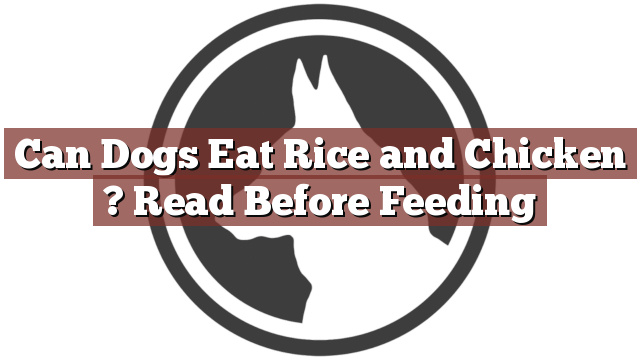Understanding Your Dog’s Dietary Needs
As a responsible pet owner, it is essential to understand your dog’s dietary needs to ensure their overall health and well-being. Dogs are omnivores, which means they can consume both meat and plant-based foods. However, their nutritional requirements differ from humans, and certain foods that are safe for us may not be suitable for them. A well-balanced diet for a dog typically consists of high-quality commercial dog food that is specially formulated to meet their specific nutritional needs.
Can Dogs Eat Rice and Chicken? Read Before Feeding
Can dogs eat rice and chicken? This is a common question among pet owners who are looking for alternative food options for their furry friends. The answer is yes, dogs can eat rice and chicken. In fact, these two ingredients are often included in many commercial dog food recipes.
Rice is a good source of carbohydrates, which provide energy to dogs. It is easily digestible and can be beneficial for dogs with sensitive stomachs or those recovering from an illness. Chicken, on the other hand, is a lean source of protein that is essential for the muscle development and maintenance of dogs. It also provides important amino acids that support their overall health.
Pros and Cons of Feeding Rice and Chicken to Dogs
Feeding rice and chicken to dogs can have both pros and cons. Let’s explore them:
Pros:
- Digestive Health: Rice is gentle on the stomach and can help alleviate gastrointestinal issues in dogs. It can provide relief from diarrhea or upset stomachs.
- Source of Energy: The carbohydrates in rice provide a quick and easily accessible source of energy for dogs, especially those with high activity levels.
- Lean Protein: Chicken is a lean and healthy source of protein for dogs. It aids in muscle growth, repair, and maintenance.
- Versatility: Rice and chicken can be used as a base for homemade dog meals, allowing you to tailor the ingredients to your dog’s specific dietary needs.
Cons:
- Allergies: Some dogs may be allergic to chicken or rice, so it is important to monitor their reaction after introducing these foods into their diet.
- Imbalance: Feeding only rice and chicken without other essential nutrients may result in an imbalanced diet, leading to nutritional deficiencies over time.
- Bacterial Contamination: Chicken, if not handled or cooked properly, can carry harmful bacteria such as salmonella, which can cause illness in dogs.
Conclusion: Making an Informed Choice for Your Dog’s Well-being
In conclusion, dogs can eat rice and chicken and benefit from the nutritional value these foods provide. However, it is crucial to take certain precautions and consider your dog’s individual needs. If you are planning to introduce rice and chicken into your dog’s diet, it is recommended to consult with a veterinarian to ensure it aligns with their overall dietary requirements. Remember, a well-balanced and nutritious diet is essential for your dog’s long-term health and well-being.
Thank you for taking the time to read through our exploration of [page_title]. As every dog lover knows, our furry friends have unique dietary needs and responses, often varying from one canine to another. This is why it's paramount to approach any changes in their diet with caution and knowledge.
Before introducing any new treats or making alterations to your dog's diet based on our insights, it's crucial to consult with a veterinarian about [page_title]. Their expertise ensures that the choices you make are well-suited to your particular pet's health and well-being.
Even seemingly harmless foods can sometimes lead to allergic reactions or digestive issues, which is why monitoring your dog after introducing any new food item is essential.
The content provided here on [page_title] is crafted with care, thorough research, and a genuine love for dogs. Nevertheless, it serves as a general guideline and should not be considered a substitute for professional veterinary advice.
Always prioritize the expert insights of your veterinarian, and remember that the health and happiness of your furry companion come first.
May your journey with your pet continue to be filled with joy, love, and safe culinary adventures. Happy reading, and even happier snacking for your canine friend!

